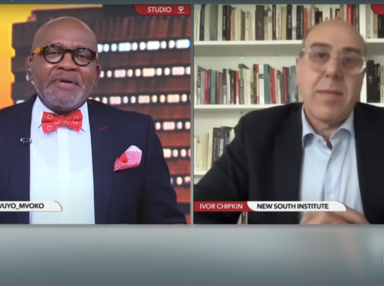Understanding Democracy, Governance, and the Delicate Balance of Power: A Conversation with Pratap Bhanu Mehta
As part of our ongoing interview series, ‘Getting to Know NSI,’ we have had the privilege of hosting a variety of key players from our institute, including our board member, Taibat Lawanson, and Distinguished Fellow, Radmila Nakarada. The purpose of these interviews, conducted by our Co-founder and Executive Director, Ivor Chipkin, is to shed light on the valuable contributions and insights of our members and to understand why they choose to engage with the New South Institute. We are pleased to continue this series with our board member, Pratap Bhanu Mehta, whose insights about Indian democracy and governance bear significant relevance in the current global context.
Pratap Bhanu Mehta, an Indian academic, brings an illustrious profile to our conversation. Currently the Laurence S. Rockefeller Professor for Distinguished Teaching at Princeton University, Mehta is no stranger to the corridors of academia and policy. His profound understanding of political theory, constitutional law, and the politics of India has established him as a renowned scholar, inspiring new generations of intellectual inquiry. In addition to being a member of our Board of Directors, he has played a pivotal role in NSI’s 2022 virtual conference ‘Architecture of Government‘, contributing to his astute understanding of the dynamics of governance.
In this interview, Mehta delves into a range of critical issues, including the majoritarian direction of Indian democracy, deepening state authoritarianism, and the challenges of corruption in delicate democracies. His reflections bring forth a sobering perspective on the erosion of checks and balances and the curtailment of civil liberties, all of which are increasingly prevalent in India’s evolving political landscape.
Drawing parallels to South Africa’s context post-2012-2015, Mehta underscores the similarities in the assault on democratic institutions, bringing the discussion closer to home. The very concept of ‘delicate democracies’ is introduced, accentuating the need for the preservation and protection of democratic institutions.
One of the many focal points of the conversation is corruption – not just as a standalone issue but also as a complex structure. Here, Mehta distinguishes between wholesale and retail corruption, and elaborates on the shifting landscape of corruption in India, from frontline services to high-level infrastructure projects. The discussion on corruption concludes with an intriguing consideration of the role of technology and institutional design in mitigating such challenges.
The conversation further explores foundational questions in political thought outside the West, addressing the breakdown of consensus and growing skepticism about previously formulated answers. Mehta explores the concept of ‘the people,’ a core question of modernity, particularly in relation to governance, shedding light on the challenges of defining political community and collective identities within liberal theory.
As a think tank, the New South Institute recognizes the crucial role we play in shaping public opinion. It is through dialogues such as these, we bring critical issues to the forefront, fostering a space for insightful and in-depth conversations.
Mehta’s comprehensive and thought-provoking insights serve to highlight the significance of the challenges faced by delicate democracies. The nuanced comparisons with the South African context resonate with the broader vision of our institute – to facilitate dialogue and provide comparative analysis for a better understanding of governance, democratic institutions, and social policy.
We invite you to watch the full interview with Pratap Bhanu Mehta on our YouTube channel as part of our ‘Getting to Know NSI’ series. Gain a deeper understanding of these complex issues and how they shape our society today. Your engagement allows us to continue providing a platform for these invaluable discussions and contributes to the rich tapestry of ideas within our institution. We look forward to your participation in this ongoing series.



